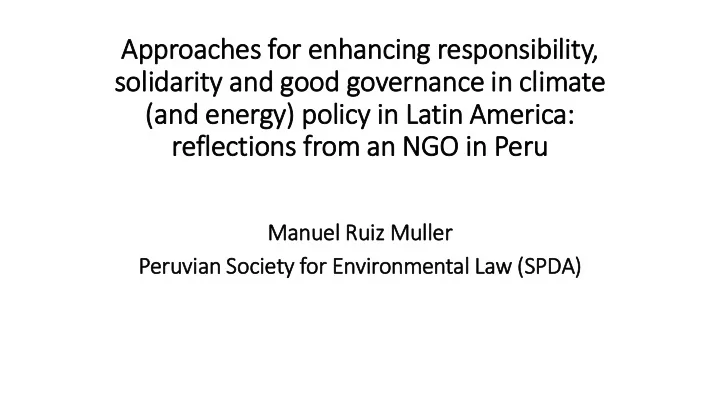

Approaches for enhancing responsibility, soli lidarity and good governance in in cli limate (a (and energy) policy in in Latin America: : reflections fr from an NGO in in Peru Manuel Ruiz iz Mulle ller Peruvia ian Society for Envir ironmental Law (SPDA)
General information on on Peru • Developing country – limited contribution to greenhouse gas emissions • Highly vulnerable to climate change impacts • Low coastal areas • Hotspot for biodiversity • Its highland agriculture (which supports most of the countries 15 million poor) is highly vulnerable to natural disasters and changes in climatic patterns – many farmers are indigenous peoples • High percentage of urban population living in high risk zones • An economy which is highly dependant on fossil fuels
Low coastal areas - potentially affected by rises in sea levels
Hotspot for biodiversity
Highland agriculture – especially vulnerable
High percentage of urban population living in high risk zones
Climate related problems have intensified
Climate related problems have intensified
One of f th the world´s most resilient and productive fi fish sheries – now affected by a more regular El l Nin ino phenomenon
In Internal recognition and acknowledgement by a a wide range of social actors ... We have a problem …
In In terms of responsibility … • The Government acknowledges that regardless of where the “causes” may lie in terms of the intensification of climate induced impacts, there is a responsibility GLOBALLY and NATIONALLY to take immediate and effective action to address climate change.
What is being done? The National Climate Change Strategy (2014) focuses on: • Mitigation measures (Nationally Appropriate Mitigation Actions) • Adaptation (spatial planning, prevention measures, capacity building, technological extension, etc.)
Undertaking mitigation and adaptation efforts … IN PARALLEL … at the same time Multidimensional approach: • National Climate Change Strategy • National Program for Adaptation to Climate Change • National Forest Program (zero deforestation by 2021!) • National REDD Desk • Projects • COP 20 – Lima Declaration
How SPDA is intervening in a process to strengthen its own responsibility with action at the local level and foster solidarity with more vulnerable communities • The Climate Changes, so Should We (joint Project with IUCN) (2011- 2014) • Documenting adaptation practices based on biodiversity resources, validating these practices through in situ research and literature reviews, streamlining results and recommendations and translating them into the national (local, regional) policy process • Internal institutional policy in SPDA for recycling wastes, changes in transport methods (almost 35% of staff use bicycles), all publications are made with certified or recycled paper, etc.
Tamshiyacu (Peru) – collective management of fisheries in diminishing lagoons (due to drought)
Chimborazo (Ecuador) – creating water “ traps ” to save and secure rain water sources
Chiquitanía forest (Bolivia) – s trengthenning local management practices based on local protocols
Reflections by SPDA • Intensified climate change effects are part of a human induced process which has continued to trigger adaptative responses and resilience … historically, this has occured regardless of the source and origin of the phenomenon • The question of “ responsibility ” is almost non present, at least at the local level – more important is to adapt as fast and efficiently as possible • There is a legal and moral responsibility and obligation from the part of the State and civil society to support vulnerable communities – and press for the international community to respond in practice through funding and technological transfer • Responsibility and solidarity come at different levels … all actors bear responsibility and need to practice solidarity (in different intensities)
Tools to support and enhance good climate policy being considered in Peru Measures • Incentives for low-carbon based industries (subsidies?) – free trade agreements • Public funding - shrinking Information • Access to technology and know-how – intellectual property • Green economy options – still “ distant ” • Scaling up of good practices and projects – need for funds, political interest, etc.
The moral imperative … fr from Garret Hardins´ “ Tragedy of the Commons ” At the end of a thoughtful article on the future of nuclear war, Wiesner and York (1) concluded that: “Both sides in the arms race are … confronted by the dilemma of steadily increasing military power and steadily decreasing national security. It is our considered professional judgment that this dilemma has no technical solution. If the great powers continue to look for solutions in the area of science and technology only, the result will be to worsen the situation . ” There is a “class of problems” for which there may be no TECHNICAL solutions … but the need for moral/ethical decisions in search of the common good? Hardin identified the arms race, global population as part of this class of problems … but maybe we could also include CLIMATE CHANGE or BIODIVERSITY LOSS within this class of problems … ?
In Interesting quotes … regarding climate change as a “ problem ” … Paul Krugmann (2008 Nobel Prize winner in Economics), referring to the pitiful fiscal stimulus during the Great Depression and underwhelming initiatives on climate change: “ policy makers just keep finding reasons not to do the right thing ” Joseph Vogel (Professor at the University of Puerto Rico), referring to discussions concerning the bottlenecks in the debates about genetic resources and climate change highlights the: “ unpersuassive power of logic ” to address the problem of benefit sharing … “ Logic ” is not as straightforwardly accepted as may be thought … may be applicable to climate change dimensions
END OF PRESENTATION mruiz@spda.org.pe
Recommend
More recommend